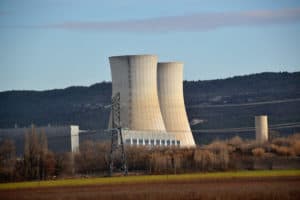
Nuclear power plant
Credit: Jeanne Menjoulet / Flickr
Once hailed as a key part of the energy future of the United Kingdom and several other countries, the high-tech atomic industry is now heading in the opposite direction, towards nuclear sunset.
It took another body blow last week when plans to build four new reactors on two sites in the U.K. were abandoned as too costly by the Japanese company Hitachi. This was even though it had already sunk £2.14 billion (300 billion yen) in the scheme.
Following the decision in November by another Japanese giant, Toshiba, to abandon an equally ambitious scheme to build three reactors at Moorside in the north-west of England, the future of the industry in the U.K. looks bleak.
The latest withdrawal means the end of the Japanese dream of keeping its nuclear industry alive by exporting its technology overseas. With the domestic market killed by the Fukushima disaster in 2011, overseas sales were to have been its salvation.
U.K. Policy Needed
It also leaves the British plan to lead an international nuclear renaissance by building ten new […]











Maybe the planet will need sophisticated SWAT teams to shut down these plants as sea levels rise threatening any multi-cellular life.
Your comments caused me to think about where and who are building new plants so I went to world-nuclear.org and “Today there are about 450 nuclear power reactors operating in 30 countries plus Taiwan, with a combined capacity of about 400 GWe. In 2017 these provided 2506 billion kWh, over 10% of the world’s electricity.
About 50 power reactors are currently being constructed in 15 countries (see Table below), notably China, India, Russia and the United Arab Emirates.
Each year, the OECD’s International Energy Agency (IEA) sets out the present situation as well as reference and other – particularly carbon reduction – scenarios. In the 2018 edition of its World Energy Outlook report, the IEA’s ‘New Policies Scenario’ sees installed nuclear capacity growth of 25% from 2016 (about 414 GWe) to 2040 (about 518 GWe). The scenario envisages a total generating capacity of 12,466 GWe by 2040, with the increase concentrated heavily in Asia, and in particular China (34% of the total). In this scenario, nuclear’s contribution to global power generation is about 10% in 2040.”
With old plants shutting and new ones coming online there is/will be a huge amount of waste that requires safe storage for 10k years to millions(?) of years for a small percentage. I live near a large nuke that has the largest waste storage pools in the country. This is such madness to continue expanding this technology without solving the waste problem. No known human civilization has lasted nearly long enough to take care of this highly dangerous stuff.
Instead of fighting China, building a wall, more funding for DOD and trips to the moon/mars we need to focus on the many environmental problems with nuclear waste being high on the list. Imagine if all the current conflictive energy was directed towards something really dangerous. MAGA in deeds not words.
Exactly Will. Nuclear energy is based on a peaceful civilization continuing well into the future. The history of humanity is anything but.
I totally agree with you Will. We need to put our money (from the Nuclear companies) toward finding some type of way to neutralize the nuclear waste like a small celled creature that eats the waste and turns it into a safe ingredient that will not harm the environment, or a natural substance that makes it neutral toward the environment. There must be some way to neutralize the waste; we just have not found it yet, but I know scientists are trying very hard on the subject, and in time may find the answer, I hope. We should have thought ahead when deciding to use nuclear power, or the most horrible weapons known to man.
Wise words Rev. Dean. That reminded me of the 7 generation principle-“The “7th generation” principle taught by Native Americans says that in every decision, be it personal, governmental or corporate, we must consider how it will affect our descendants seven generations into the future.
[Western society generally considers a generation to be 25 years; the Lakota Nation considers one generation to be 100 years]..”
What a different world we would live in if the 7th gen principle was often applied. Once one starts considering how that could work we could not live individually and collectively continue as we have done. Of course that would require a level of maturity, wisdom or patience that I and many others do not yet possess.